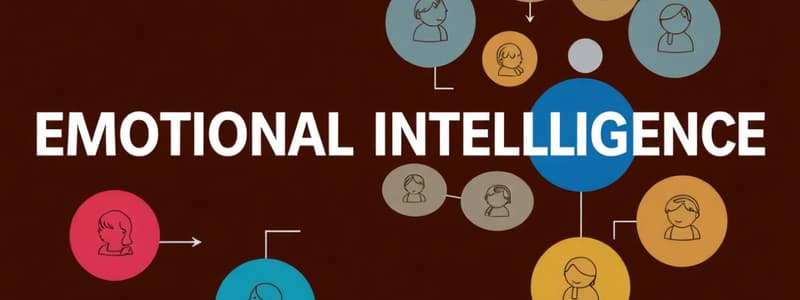Podcast
Questions and Answers
What is a key characteristic of a Diverger?
What is a key characteristic of a Diverger?
- They enjoy seeing immediate results.
- They focus on developing theoretical models.
- They prefer working with critical data.
- They excel at brainstorming and collaboration. (correct)
Which learning style is characterized by a strong inclination towards problem-solving?
Which learning style is characterized by a strong inclination towards problem-solving?
- Diverger
- Accommodator
- Assimilator
- Converger (correct)
What does the term 'human capital' refer to in management development?
What does the term 'human capital' refer to in management development?
- The theoretical knowledge within the organization.
- The social connections that individuals or groups have.
- The investment in an individual's competencies. (correct)
- The processes and technology of the organization.
Which type of capital is concerned with the procedures and technology of an organization?
Which type of capital is concerned with the procedures and technology of an organization?
What is a defining trait of an Accommodator?
What is a defining trait of an Accommodator?
What is a primary characteristic of effective leadership according to the content?
What is a primary characteristic of effective leadership according to the content?
Which of the following is NOT one of the four types of emotional intelligence?
Which of the following is NOT one of the four types of emotional intelligence?
Which of the following best describes the difference between first-order and second-order changes?
Which of the following best describes the difference between first-order and second-order changes?
In what manner do leaders differ from managers in their approach to change?
In what manner do leaders differ from managers in their approach to change?
Which of the following attributes is essential for a leader according to the content?
Which of the following attributes is essential for a leader according to the content?
What role does a manager play in team building?
What role does a manager play in team building?
How does a protean career differ from other career models?
How does a protean career differ from other career models?
Which of the following is a key duty of a manager?
Which of the following is a key duty of a manager?
Study Notes
Management Development
- Characterized by continuous change and crisis that affect management in an organization.
- Leadership and management differ in their approach to change, people, power, tasks, and commitment to goals.
- Leadership focuses on providing mission, inspiring, influencing, doing the right thing, and passionate commitment.
- Management focuses on implementing change, controlling, having authority, doing things right, and an impersonal approach.
Leadership Attributes
- Emotional intelligence: Understanding both personal feelings and the emotions of others.
- Mental agility: Flexible minds to make swift and informed decisions.
- Flexibility: Adaptability to changing situations.
- External energy and inner strength: The capability to face challenges.
- Vision creation and influence: Inspiring others to achieve goals.
Manager's Duty
- Organize, plan, control, and lead.
Types of Emotional Intelligence
- Self-awareness: Understanding one's own emotions and how they affect others.
- Self-management: Managing one's own emotions and behaviors.
- Social awareness: Understanding the emotions of others and their perspectives.
- Relationship management: Building and maintaining positive relationships.
Power Ps of Successful Leadership
- People-oriented
- Purposive
- Progressive
- Perspicacious
- Presence
- Presenter
- Participative
- Perceptive
- Persistence
- Personal awareness
- Principled
- Passion for growth
Roles of a Manager
- Guide individual and team performance.
- Facilitate continuous learning and employee development.
- Facilitate change within the organization.
- Facilitate decision making.
- Resource planning and allocation.
- Team coordination and activities.
- Group representation.
- Team building and trust.
Career Paths
- Single career: Focus is within a single organization.
- Protean career: Shifting career focus, less emphasis on organization and status.
- Psychological success: Focus on personal fulfillment and growth rather than solely organizational success.
Types of Change
- First-order change: Incremental, evolutionary, small, and time-based.
- Second-order change: Radical, revolutionary, large, and rapid.
Management Learning Styles
- Diverger: Good at brainstorming, collaboration, and looking at things from different perspectives.
- Assimilator: Strong in understanding and developing theoretical models.
- Converger: Excel at problem-solving, technical skills, and working with critical data.
- Accommodator: Rely on instinct and experience, enjoy taking action and seeing results, excel in adapting to new situations.
Management Development Approach
- Human capital: Investing in the competencies of individuals within an organization.
- Organizational capital: Understanding procedures, technologies, and information flow within an organization.
- Social capital: Goodwill available to individuals or groups.
- Intellectual capital: The ability to learn and leverage knowledge within a social context.
Studying That Suits You
Use AI to generate personalized quizzes and flashcards to suit your learning preferences.
Related Documents
Description
This quiz explores key concepts in management development and leadership attributes. It highlights the differences between leadership and management, the importance of emotional intelligence, and the essential duties of a manager. Test your understanding of how managers adapt to change and inspire others in an organizational context.



